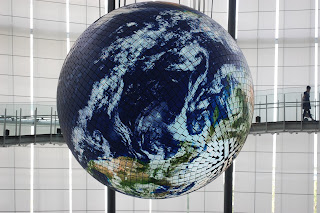There
once was a dream to integrate the world’s population financially, and through
transport and trade routes into one big community. A dream in which the most
pressing problems were solved through diplomacy and concerted efforts, where
the rich held on to the poor and pulled them out of poverty. Nations trading
themselves out of extreme poverty and people moving around freely to fulfill
their dreams and better themselves and their communities.
This
was the dream of multilateralism. The dream that the World Trade Organization,
the United Nations and its agencies, International agreements like Copenhagen,
and the Millennium Development Goals sought to achieve. While that dream seemed
achievable in the 2000s, very few will argue that it is stuff for the textbooks
and seminars as the world stares as work that was done towards achieving
multilateralism is being dismantled.
We did
have a taste of multilateralism, and it got us excited about what the world
could achieve, if we all worked together. Through a number of high-level
conferences, the world leaders were able to come to an agreement on curbing
emissions for environmental protection. This was followed by emission trading
schemes and the World Economic Forum made it a point of involving the business
communities in efforts to protect the environment.
The World Trade Organization launched
the Doha Round of Trade negotiations with the specific aim of boosting trade in
developing countries and helping in their development process. The United
Nations and its agencies launched the Millennium Development Goals (now
replaced by the Sustainable Development Goals), engaging partners and resources
at all levels around eight goals that were aimed at halving poverty by 2015.
G20 summits were highly anticipated, and measures were taken towards improving
trade, curbing protectionism and stabilizing fiscal and monetary policies
around the world to strengthen development. A lot was achieved, and there was
more to come, until things turned sour.
We can
blame it on the financial crisis in 2008/2009, the wave of terrorism that
increased vigilance around the world, the rising wave of nationalism and more
recently the rise of populist leaders. The truth is, we cannot stop wondering
if multilateralism was only ever a dream. Many wondered the effect an explosion
of Regional Trading Agreements in the late 90s and 2000s will have on the
Multilateral Trading System. It all seemed so positive, that only a few had the
foresight to see that all it took was some hardships, stumbling blocks, and ‘a
threat to our way of life’ for multilateralism to become the forgone
alternative. Who would have imagined, that it would take an American president
to put in doubt the outcome of a global push towards environmental protection,
achieved by another American president by chasing a Chinese delegation in the
hallways at Copenhagen. That the Chinese would today emerge as the leaders of
the free world, advocating for free trade and movement of goods and services
while the Americans resort to building ‘walls’.
The
European Union is threatened by the exit of the United Kingdom from the EU, and
there is uncertainty regarding the process of negotiation that will ensue in
the following months and years. Temporary camps for refuges around Europe are
likely to become permanent homes, as thousands meet their fate in oceans and
high sees escaping persecution, hunger and violence. It is not hard to see why
in a recent rally, German Chancellor Angela Merkel calls on fellow Europeans to
take their fate into their hands, and depend on Europe.
As one
would imagine, in the midst of all these uncertainties, aid and development
initiatives in Africa and other poor regions of the world have been relegated
to the background. There is a new socio-political map about to be drawn, and
the changes that will accompany this new map are not necessary bright for those
whose waist deep in poverty or whose livelihoods are threatened by
environmental changes.
Yes,
multilateralism is about to become one of those theories for International
Relations textbooks and the subject of conferences, except it receives a jolt
in the direction. It is hard to see where that jolt will come from, but one can
only hope that a recovering world economy will bring with it a new push for
global problem solving.



